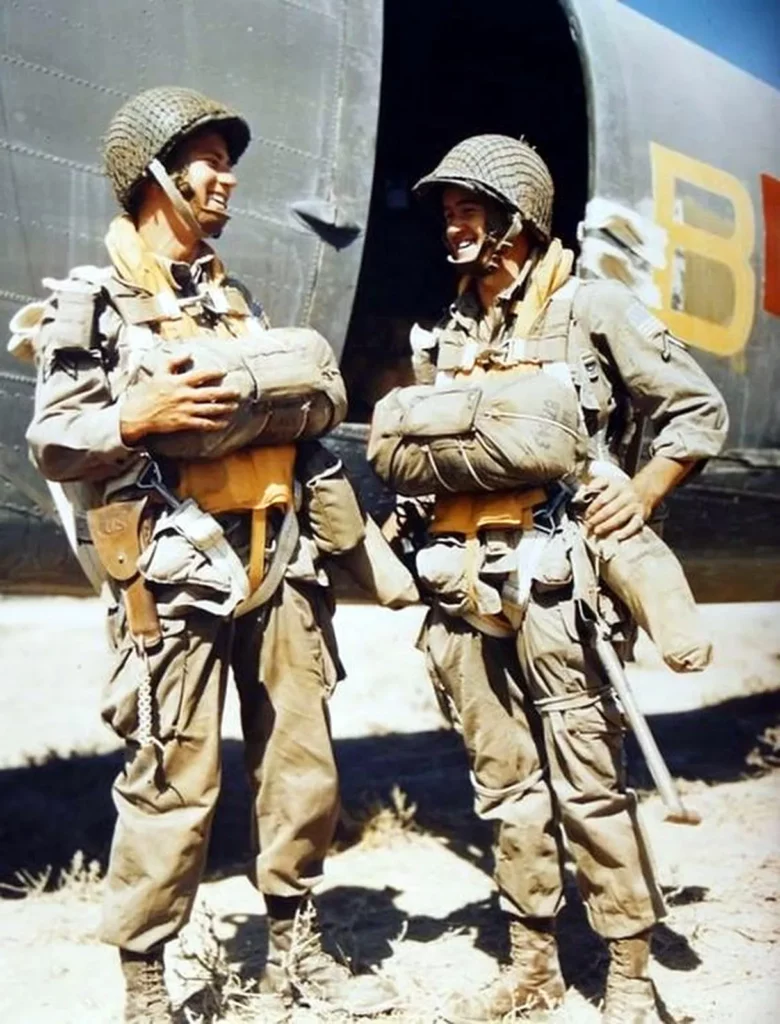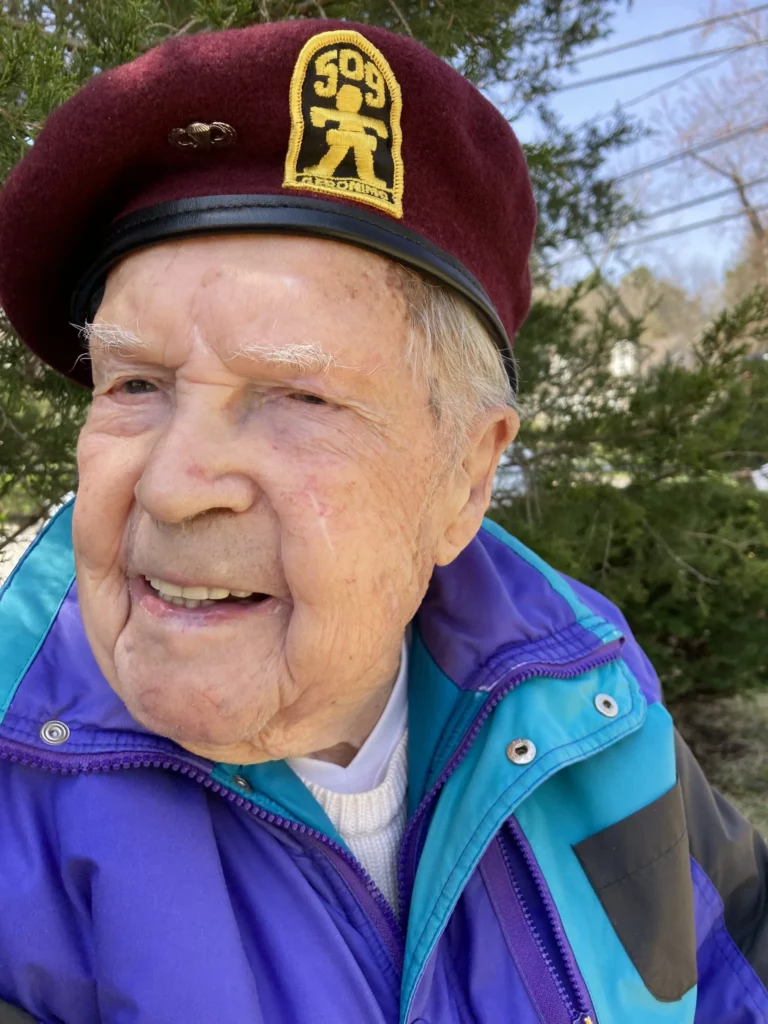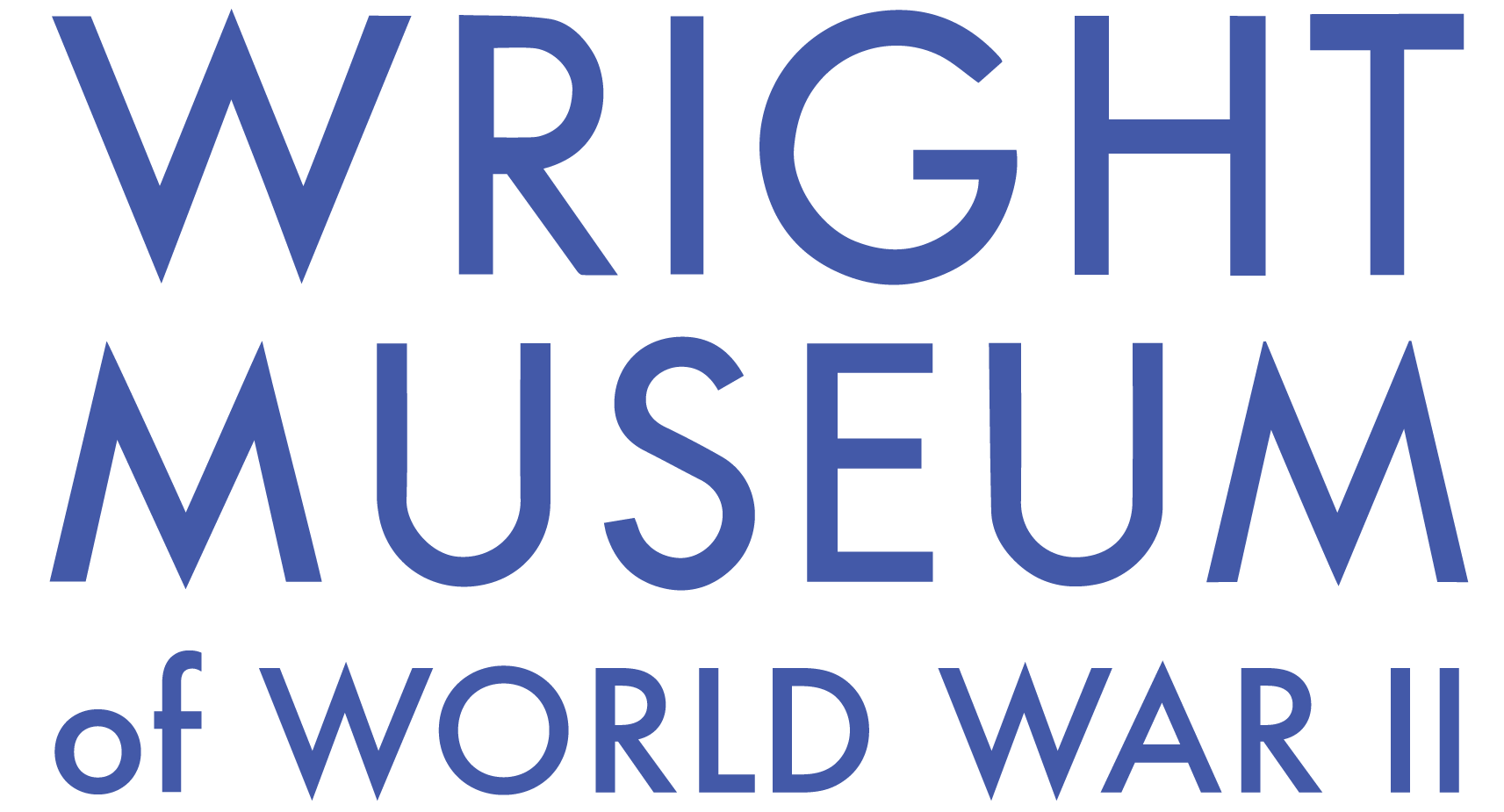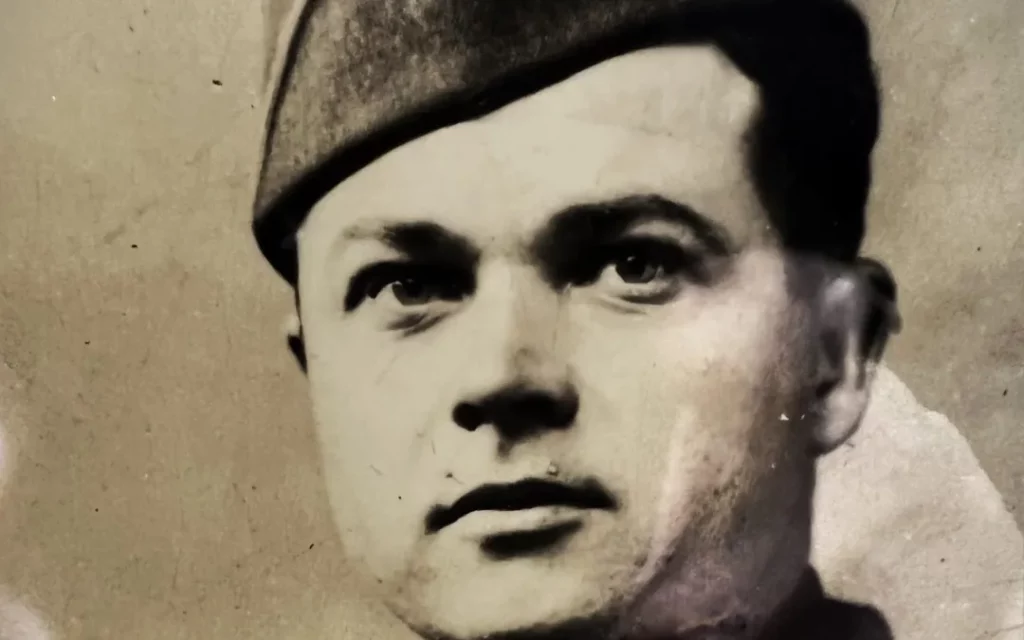The following is a guest post written by author Amy Zuckerman, edited in conjunction with Wright Museum staff.
Charles Audet and all the surviving World War II veterans of the 509th Parachute Infantry Regiment are national treasures. Besides Audet – known as Charlie — these veterans are Mort Katz, Lloyd Plummer, and Rex Dye. Another member, Thomas Wimberly, died recently, on Father’s Day weekend, 2022.
In August 2022 Charlie was 103 and 10 months old. He is the oldest of the 509th remaining members. The story of Charlie’s fighting in World War II traces a large portion of the 509th’s role in the North African and European Theaters, starting with Operation Torch in Oran, Algeria, on November 8, 1942, through to the German surrender. All told, Charlie fought in World War II for four years and three months.
Operation Torch was the first time American paratroopers invaded enemy territory. Those paratroopers were members of the “509th,” as veterans call their unit. Their battle cry is “Geronimo,” which was named after the famous Apache Native American leader. According to historical reports, 509th paratroopers incorporated the name “Geronimo” into their insignia with the permission of Geronimo’s descendants.
From 1942 through the end of the war in 1945, members of the 509th helped save millions of people through their courageous fighting in many of the fiercest battles of the war. The remaining 509th World War II veterans are among the few paratroopers who can tell the world what it was like to jump out of an airplane into enemy territory, survive the landing, get their gear, regroup with their fellow paratroopers, and join American forces fighting the Germans.
Charlie and his 509th buddies are arguably some of the unsung heroes of World War II. They received their medals, but never received the public recognition that World War II historians believe they deserved. At the beginning of the war there were 500 members of the 509th. Only 100 survived the war.
Charlie and the 509th fought in many of the fiercest battles of World War II. These included Operation Torch in 1942 and Operation Giant III in Avellino, Italy in September of 1943. In December of 1944 he fought in the Battle of the Bulge in the Ardennes Forest
Miraculously, Charlie was never hurt during what paratroopers call “a jump.” His worst jump was during training in Chilton Foliat, England in the summer of 1942. During the jump, his parachute went over in a stonewall and he was caught on the other side of the wall.
Charlie was wounded by shrapnel during battle in Belgium in early 1945. He was sent to a hospital located on the French and German border. After a period of recovery, he was deemed fit and sent back to fight. He then had the joy of watching German troops surrender in May of 1945.
Charlie ended his Army career as a corporal. For his courage and valor in battle he was awarded the Purple Heart and Bronze Star.

The 509th Parachute Infantry Association Continues On
The 509th remains an active paratrooper unit garrisoned in Fort Polk, Louisiana. The long history of the regiment is posted on the fort’s website.(https://www.509thgeronimo.org/f509thtimeline.html)
Veterans from World War II through recent wars gather for annual reunions that are sponsored by the 509th Parachute Infantry Association. Charlie said Vietnam veterans make up the association’s largest group of members. Charlie has been an avid member of the association over the decades and has attended many of its reunions. As long as he is healthy, he plans to continue attending – he turned 104 years old on October 18, 2022.
Besides staying in touch with paratroopers he met during the war, Charlie has befriended veterans like Lloyd Plummer. “He was at The Battle of the Bulge. He got wounded a couple of times. We communicate. He lives in a small town. I didn’t know him personally during the war, but I’ve met him at Army reunions. The battalion had about 500 men. I didn’t know all of them. If they were in a different company, you didn’t know them personally. We didn’t have the same targets.”
Charlie enjoys hanging out with the younger veterans and credits some of them for helping him talk about the trauma he suffered during and after World War II. “By volunteering, I was able to deal with the stuff that was in the back of my mind. I would tell them [the younger 509 vets] that the war was tough.”
He said some of his battle experiences were so bad that “you don’t think about it. I lived for decades [without talking about his combat experiences]. It was hard coming home to civilian life. I had such negative feeling about the war and what it did to me. I saw everyone walking around – young people and my parents – who were all pretty calm. I didn’t have that calmness. I was always thinking where’s the next combat,” he explained.
For years Charlie said if people wanted to know something about his battle experiences, especially a reporter, “I would tell them a story” but not discuss anything personal.
“People ask me to speak, but since I broke my hip two years ago [in August 2020] I can’t get around as well as I could.” In the early summer of 2022 Charlie survived an attack of Covid that he believes in contracted at a ceremony in his honor at the mayor’s office in Framingham, Massachusetts, a small Massachusetts city where he lived for 35 years.

Charles Audet turned 104 in October, 2022. Photo Courtesy of Amy Zuckerman
Helping veterans today
Even at nearly 104 years old, Charlie is working to assist veterans of the 509th.
“We try to make sure the veterans, if they need anything, we can help them. A lot of them — say people from the VFW — may have programs to help people. A lot of us are looking for survival, you know? And so that’s where their effort goes. The 509 has active-duty people who are supporting veterans,” he explained.
“I was on a couple of fundraising committees for fallen soldiers. We’re trying to raise $50 million in scholarships for their children.”
Charlie says that today’s veterans “need support from the people. A lot of people don’t like the military and they can be considered bad and don’t accept the dangers we go through. I have a nephew who is a chaplain at a VA hospital in Mississippi. He encounters men with drugs and alcohol problems. When a veteran comes back it’s hard for them.”
Advice to today’s young people
“Well, I can tell you this… I would recommend any young man to go into the service. He would find himself. You go in as a boy and come out as a man. Just being a bellhop [before he was drafted by the Army in 1941] I had no ambitions, but the 509th brought that out by serving for my country and community.”
Charlie says that young women, who are now allowed to fight, “can do as well as the men. They may not have the same physical strength, but at my last visit to Fort Benning, Georgia two or three years ago I saw a new crew of women jumping. There were probably about 12 women jumping. It was amazing to see them.”
Charlie never sought fame and he finds it a bit awkward to be in the limelight. After he received news coverage in the spring of 2022 for helping his nephew launch a free roof for veterans program, he has had a lot of calls to speak and some honors.
“I never looked for fame. It was more about satisfaction. It was realizing that I could do good and that made me feel good. It’s not about me. It’s about what I can do for veterans. When you can help people that gives you that good feeling and encourages you to do more.”
About the author:
Amy Zuckerman is an author, a former journalist, and World War II buff. From the 1990s through 2010 she wrote for 60-plus publications worldwide about the emergence of global economic warfare and through her articles tracked the evolution of the global supply chain. Her books and awards can be seen on her business website www.aizmarketing.net. She lives in Sunderland, Mass.





